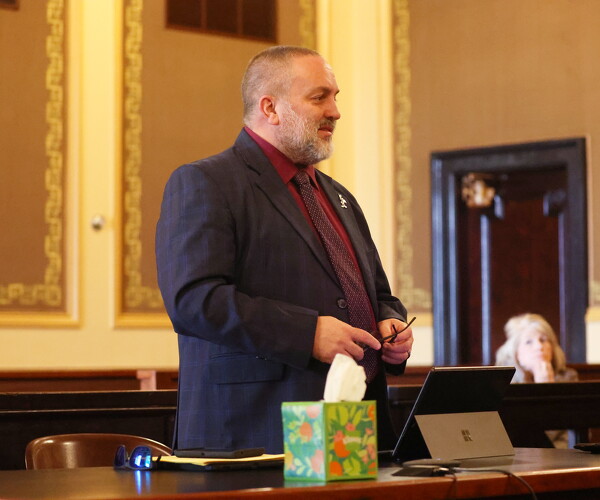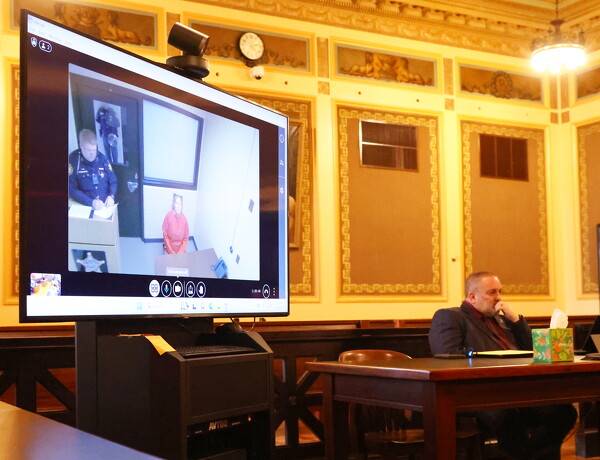
Mercer County Public Defender Thomas Lucente Jr. addresses the court on Friday during a sentencing hearing.
CELINA - The Mercer County Public Defender Office, though still in its infancy, is running like a well-oiled machine that so far has managed about 275 criminal cases since officially opening in June, according to officials.
Coming into a department started from scratch, county public defender Thomas Lucente Jr. of Lima had anticipated a boatload of difficulties. But after assembling a seasoned legal team and gaining the cooperation of local judges and prosecutors, things have went surprisingly well, he said.
Lucente brought on former colleague Jim Hearn Jr. of Wapakoneta as assistant public defender and Chastity Eisenhut and Kaitlan Jones as legal assistants. Both Hearn and Jones previously worked at Auglaize County Public Defender Office and Eisenhut at Foundations Behavioral Health Services in Celina.
"Not to toot our horn but this county was fortunate that it got two attorneys who both have a lot of legal experience," Hearn said. "That's not real typical to a public defender office opening up."
The office is located on the second floor of the Central Services Building, not far from county commissioners' chambers. Lucente and Hearn met in law school at the University of Toledo and previously worked together for 10 years. They also had practiced in the county's court system before joining the public defender office.
"The leadership team that Tom put in place bringing Jim on board and an experienced staff, it's almost close to like plug and play in the sense that we got operating very, very quickly," said county treasurer David Wolters, one of five commissioners tasked with securing a public defender and getting a new county department off the ground.
"Everything fell into place much quicker than I had anticipated from the real world," said fellow commissioner Ted Bertke, a retired insurance agent from Maria Stein. "They grabbed it, took it and they ran with it."
Due to a dwindling number of area attorneys, county officials elected to change the way they handle indigent defense counsel by moving from a decades-old court appointed system to a public defender office.
Early last year, county commissioners appointed Lucente as the first public defender. The attorney, veteran and former journalist vowed to provide excellent criminal defense on par with any private law firm for indigent people entangled in the county court system.
Lucente began work last April but told judges he probably wouldn't be ready to start taking cases - both misdemeanor and felony, including juvenile - until July or maybe even August.
"But we actually started taking cases in May, unofficially, then I told the judges June 1 would be our first date of officially taking appointments," he said.
Since then, his office has resolved 144 cases and has 126 active cases and about five inactive cases. Of that total, 103 misdemeanor and 31 felony cases have been closed out.
"When I came on board, I thought I would need two-and-a-half attorneys," Lucente said. "So far, we're handling it fine. Currently we have 126 open cases. Sounds like a lot, but my staff is very efficient. They're providing me with motions I need before I even ask for them."
Lucente manages felony cases in the county common pleas court presided over by judge Matthew Fox and Hearn is responsible for misdemeanor cases in Celina Municipal Court presided over by judge Kathryn W. Speelman. They also work in county probate/juvenile court, which is overseen by judge Matt Gilmore.
"Our goal is always efficiency, providing a good legal system the most efficient way we can," Hearn said. "We want to save the county as much money as we possibly can."
County commissioners committed to fund the upfront costs of the office and approved a budget of $365,0000 this year, an amount that allows the public defenders to obtain drug testing, polygraph and others services from experts.
The Office of the Ohio Public Defender reimburses the county for indigent defense expenses. The reimbursement the rate the last three months has been about 85%, according to Lucente.

Public defender Thomas Lucente Jr. represents a client who appears in court via teleconferencing.
Speelman informs defendants in municipal court of their right to counsel. If they face incarceration or other significant loss of liberty and are considered indigent, they are told they can apply for a public defender, Hearn said.
"I think the judges are actually more excited when they get a lawyer than if they don't get a lawyer," he said. "In municipal court, she's encouraging everyone that qualifies to get the public defender's office."
Judges generally prefer to see professional attorneys assigned to cases to avoid delays and questions down the road about proper representation, said public defender commissioner Paul Howell, a one-time county prosecutor and former criminal defense attorney.
Hearn handles first- to fourth-degree misdemeanor cases. Minor misdemeanors such as traffic offenses do not qualify for his services. The most common violations appear to be domestic assault, followed by OVI, he said.
"The volume is pretty significant," he said. "We sort of jumped into the deep end of the pool in June, July, and so in a half year we can probably extrapolate the numbers out that it's going to be somewhere in-between 270 to 300 municipal court cases a year."
At present, Hearn said he's able to give a good deal of attention to his cases and encourages clients to review discovery evidence against them, including video footage.
Some clients generally care about their cases and call weekly for updates while others may not speak to Hearn until their court date, he said.
The process of being assigned a public defender is similar in common pleas court. Felony cases he's handled so far run the gamut from fifth-degree drug possession to first-degree rape, Lucente said.
"Felony cases kind of build upon each other so we may get five or 10 new cases a month but we can't close out five or 10 a month, so it just slowly builds," he said.
To date, Lucente has not had to go to trial, as all of his cases have been resolved through plea agreements, he said. Two cases set for trial were settled at the last minute and another is currently set for trial in March, he said.
His clients ultimately decide whether to take a plea agreement or go to trial, Lucente said, stressing he never pushes them into a deal with prosecutors.
"We don't do that," he said. "Quite frankly, I enjoy trials. I want to go trial."
Some clients, though, are content with the deal offered and choose not to go that route.
Lucente said the lack of trials here is somewhat of a culture shock for him, coming from Allen County where there's a trial every week. But Lucente acknowledged that if every case went to trial, the court system would shut down.
"I think that this county is fortunate in that it's everybody, I believe, trying to move the system along as efficiently as possible," added Hearn.
Most defendants in the court were born and raised in Mercer County and will return here to live out the rest of their lives, according to Celina-based attorney Louis Schiavone who helped facilitate the county's transition to a public defender system.
This understanding has typically been shared among judges, prosecutors and defense attorneys, though they obviously each have a clearly defined role.
Case resolution also involves law enforcement and usually the victim, noted public defender commissioner and retired attorney Jim Tesno.
"It's all trying to come to a resolution that is acceptable to everybody, and when you can't reach that resolution for whatever reason you have a trial," he said. "If you come to a resolution that is acceptable and works within the system, I think it's best for everybody."
Lucente and Hearn characterized their relationships with the judges and county prosecutor Erin Minor and city law director/ municipal court prosecutor George Moore as positive, saying there is a mutual understanding and willingness to be reasonable.
"There's not really a gotcha mentality in Mercer County," Hearn said. "They're not trying to go out of their way to see people punished more than they need to be punished. I think that as far as courts go, it's very fair."
"Everybody has to work together and I think that's happening now," added Howell, who practiced both sides of the law at different points in his career.
However, that doesn't mean the public defenders won't passionately go to bat for their clients.
"Don't get the impression that on individual cases our guys here at the public defenders don't lock horns with the prosecutor's office," Howell said. "That is always going to happen and that's healthy, that's the way it should be."
"We hold our grounds. Neither side is folding," Lucente said.

